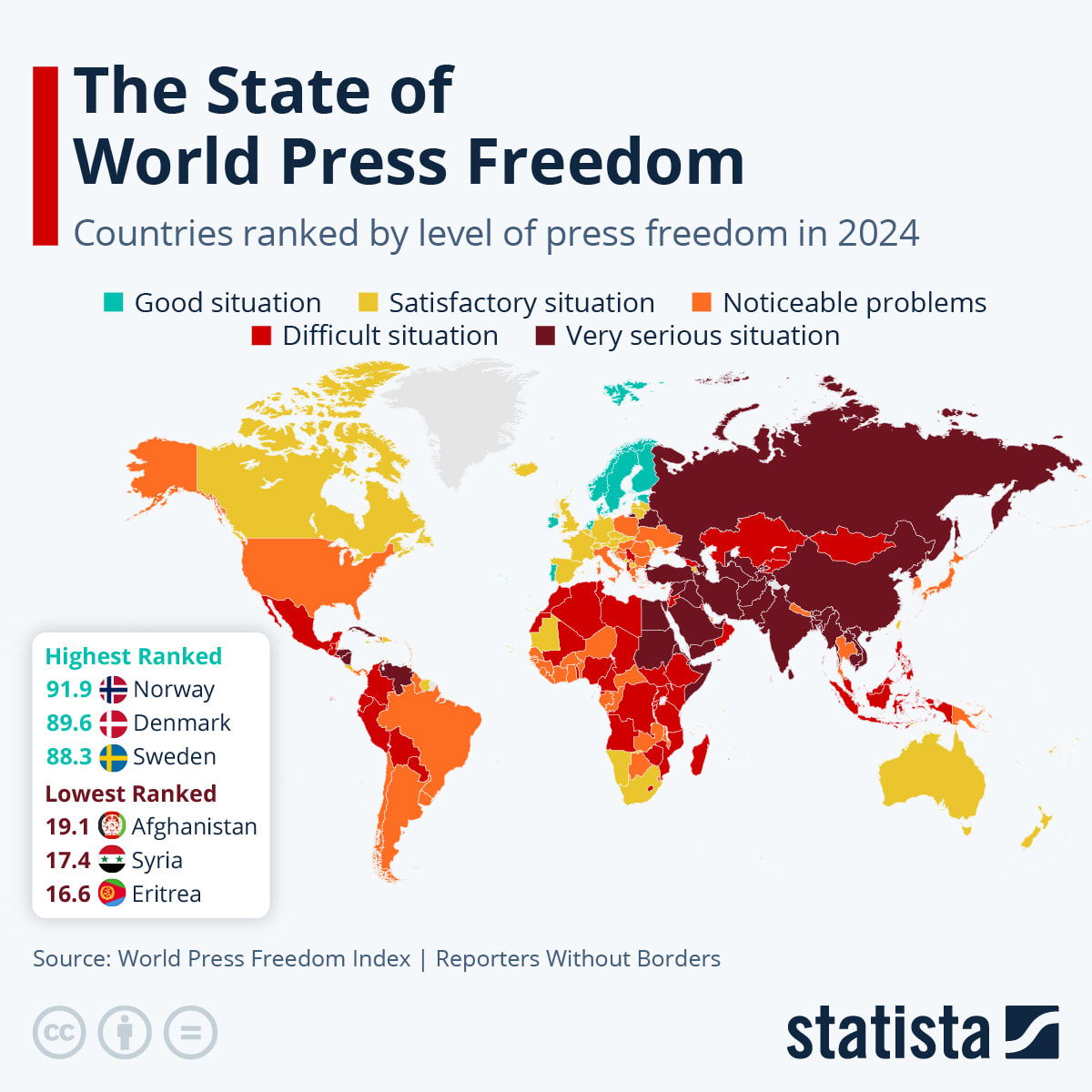Current State of Press Freedom
By Siya Sawhney @ 2024-07-14T13:56 (+2)
Note: This post explores the question of what the current state of press freedom is, in 2024. The post briefly examines countries based on their World Press Freedom Index (values from https://rsf.org/en/index), and makes some inferences supported by the RSF's released data. Feel free to add on to this post with any further trends, justifications, or outliers you have identified.
Defining Press Freedom
According to The National Constitution Center, Freedom of the press means that "members of the public can criticize the government without fear of reprisals or censorship". It refers to the rights of journalists, news organizations, media sources, and individuals to gather, publish, and disseminate their opinions or information without interference, censorship, or the fear of retribution from the government or other authoritative entities.
Some Impacts of Press Freedom
As a result of press freedom, some positive impacts that it yields includes:
- There is increased transparency and accountability. For instance, the press can hold institutions or governments accountable by exposing corruption, abuse of power, or human rights violations.
- Additionally, the public has access to unbiased and accurate information, enabling them to be more informed and make better decisions.
- This access to information is crucial for empowering people and can foster participation in democratic processes such as voting.
- As stated by the United Nations "Media freedom and access to information feed into the wider development objective of empowering people."
By ensuring that diverse voices and perspectives are heard, press freedom can contribute to a more equitable and just society.
Source: https://www.statista.com/chart/13640/press-freedom-index/

Inferences - Supported by RSF's Interpretations
This index was initially released by Reporters Without Borders (RSF) which can be found through this link: https://rsf.org/en/index.
- According to RSF, there is a “worrying decline in support and respect for media autonomy and an increase in pressure from the state or other political actors.”
- "Out of the 180 countries and territories analyzed, some 138 places had a majority of their respondents say that political actors in their countries were involved in disinformation or propaganda campaigns. This involvement was described as 'systematic' in 31 countries"
- Additionally, significant comparisons can be made from the press freedom in 2020. For example, in 2020, the USA had an index score of 77.07 and ranked 35/180 countries in terms of liberty of the press. However, in 2024 USA had a reported index score of 66.59 and rank of 55/180.
Elections are often accompanied by violence against journalists, as in Nigeria (112th) and the Democratic Republic of Congo (123rd). The military juntas that seized power in coups in the Sahel, especially Niger (down 19 to 80th), Burkina Faso (down 28 to 86th) and Mali (down one to 114th), continue to tighten their grip on the media and obstruct journalists’ work.
In the absence of regulation, the use of generative AI in the arsenal of disinformation for political purposes is a concern. Deepfakes now occupy a leading position in influencing the course of elections.
Many governments have stepped up their control over social media and the Internet, restricting access, blocking accounts, and suppressing messages carrying news and information.
Some political groups fuel hatred and distrust of journalists by insulting them, discrediting them, and threatening them.
- 2024 is noted as the biggest election year in modern history, with countries such as the USA, India, Russia, Iran, Pakistan, and Mexico undergoing their election processes. As a result, violence against journalists reporting on electoral processes, increased regulation in the face of generative AI, and governments restricting social media information dissemination justifies how the freedom of press on a global scale has largely decreased
The Maghreb - Middle East region is the one with the worst situation in the 2024 World Press Freedom Index. It is followed by the Asia-Pacific region, where journalism is suffocating under the weight of authoritarian governments. Africa, although less than 10% of the region is in a “very serious” situation, almost half of the countries are in a “difficult” situation.
The countries where press freedom is “good” are all in Europe, and more specifically within the European Union, which has adopted its first media freedom law (EMFA). Ireland has dropped out of the Index’s top three countries, replaced by Sweden, while Germany is now one of the top ten countries.
- With the Asia-Pacific and Middle East regions in particular, it is clear that a large number of major countries such as Russia, China, India, Saudi Arabia, Afghanistan and Iran have a relatively higher index score in comparison to more Western countries - noting that the top 10 countries with the highest index score (and therefore the most press freedom) are all located in the Europe.
Larks @ 2024-07-14T19:42 (+2)
Do you have much confidence in their methodology? It seems very subjective to me, and includes lots of factors which are basically "is it nice to be a journalist" rather than "are journalists unfree". When I look at what they marked the US down for my overall takeaway is that some of the things are bad but irrelevant - unprofitable newspapers closing down or journalists not being trusted are just totally different issues - and good things like the US's very robust first amendment protections are simply not mentioned at all. If this is enough to give the US a middling score then they must be grading very harshly. In contrast the existence of statutory censorship seems to go unmentioned for some other countries, even though this is surely a much more significant restriction on press freedom.